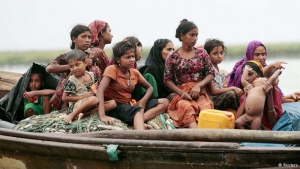
In 2013, the United Nations described the Rohingya ethnic minority in Myanmar as one of the world’s most persecuted minorities. The majority Muslim ethnic group has lived in Myanmar for centuries. The population endures systematic oppression from the Myanmar government that has denied over a million Rohingya citizenship and displaced around 140,000 Rohingya Muslims. According to Human Rights Watch (HRW) the “Burmese authorities and members of Arakanese groups have committed crimes against humanity in a campaign of ethnic cleansing against Rohingya Muslims in Arakan State since June 2012.”
So, why is news of this large-scale human rights violation only now circulating around the news? Like the Nazi Party during World War II, the Burmese government is arguing that nothing wrong is happening, going so far as to blame the media for spreading false information. Aung San Suu Kyi, leader of the National League for Democracy in Myanmar and Nobel Peace Prize recipient, told Turkish President Recep Tayyip Erdogan that Myanmar “know[s] very well, more than most, what it means to be deprived of human rights and democratic protection,” and that the government is making sure “all the people in our country are entitled to protection of their rights as well as, the right to, and not just political but social and humanitarian defense.” Researchers at Queen Mary University London argue that her silence on the issue and her inability to act amounts to “legitimizing genocide” and embeds “the persecution of the Rohingya minority” (Khan).
Many nations have spoken out against the Rohingya crisis. Bangladesh has called on the international community to intervene, as the country is now facing a large influx of Rohingya refugees. According to the HRW, international aid has been suspended which means “more than 250,000 Rohingya Muslims” are left “without medical care, food, and other vital humanitarian assistance.” The U.S. State Department announced their plans to allot around $32 million in aid to those oppressed in Myanmar’s Rakhine state. When the United Nations Human Rights Council approved an investigation of the persecution, the Myanmar government denied entry of the investigative group in June. Representatives were able to enter the country in July, though they were greeted with hostility. Other groups have been involved in helping the Rohingya Muslims, with India sending aircraft assistance to Bangladesh to help the refugees. Many Bangladeshi citizens are also helping by offering assistance and accommodation to many of the refugees. Let’s hope that the international community steps up and does more to help the Rohingya. Doing nothing makes the world a collaborator in their persecution and oppression.
Works Cited
Burma: End ‘Ethnic Cleansing’ of Rohingya Muslims. Human Rights Watch, 3 Oct. 2017,
Khan, Shehab. “Burma’s Aung San Suu Kyi Accused of ‘Legitimising Genocide of Rohingya Muslims’.” The Independent, Independent Digital News and Media, 25 Nov. 2016,
Pirani, Fiza. “Who Are the Rohingya Muslims? 7 Things to Know about the ‘World’s Most Persecuted Minority.’” Ajc, Cox Media Group , 20 Sept. 2017,
Staff, Al Jazeera. “Myanmar: Who Are the Rohingya?” Myanmar: Who Are the Rohingya?, Al Jazeera, 28 Sept. 2017,
What’s Happening in Burma? United to End Genocide, endgenocide.org/conflict-areas/burma/.
